Top Rankings
Trenton School District ranks among the top 20% of public school district in Tennessee for:
Category
Attribute
Graduation Rate
Highest graduation rate (Top 20%)
Diversity
Most diverse schools (Top 1%)
For the 2025 school year, there are 3 public schools serving 1,366 students in Trenton School District. This district's average testing ranking is 4/10, which is in the bottom 50% of public schools in Tennessee.
Public Schools in Trenton School District have an average math proficiency score of 27% (versus the Tennessee public school average of 31%), and reading proficiency score of 31% (versus the 37% statewide average).
Minority enrollment is 39% of the student body (majority Black), which is less than the Tennessee public school average of 43% (majority Black).
Overview
This School District
This State (TN)
# Schools
3 Schools
1,925 Schools
# Students
1,366 Students
1,010,424 Students
# Teachers
88 Teachers
66,546 Teachers
Student : Teacher Ratio
16:1
16:1
District Rank
Trenton School District, which is ranked within the bottom 50% of all 147 school districts in Tennessee (based off of combined math and reading proficiency testing data) for the 2021-2022 school year.
The school district's graduation rate of 95% has stayed relatively flat over five school years.
Overall District Rank
#100 out of 147 school districts
(Bottom 50%)
(Bottom 50%)
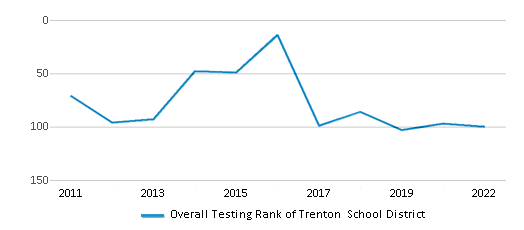
Math Test Scores (% Proficient)
26%
31%
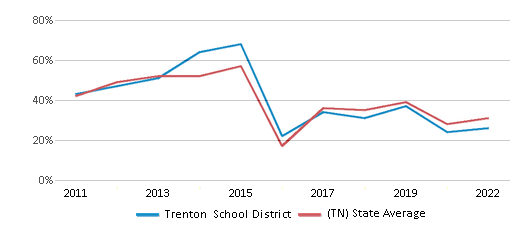
Reading/Language Arts Test Scores (% Proficient)
31%
37%
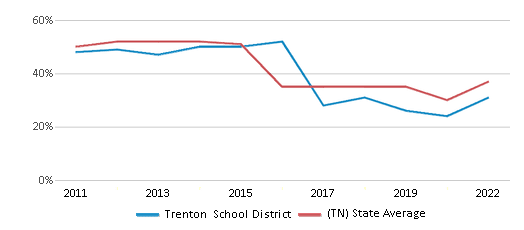
Science Test Scores (% Proficient)
38%
40%
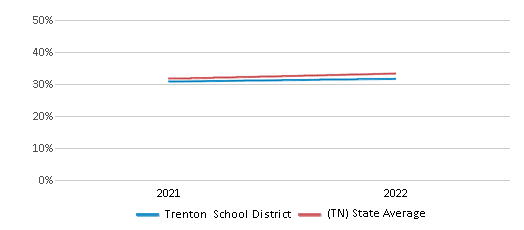
Graduation Rate
≥95%
90%
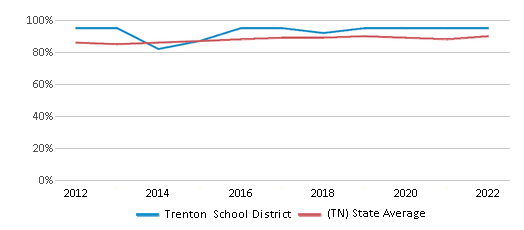
Students by Ethnicity:
Diversity Score
0.56
0.61
# American Indian Students
1 Student
1,743 Students
% American Indian Students
n/a
n/a
# Asian Students
4 Students
21,159 Students
% Asian Students
n/a
2%
# Hispanic Students
132 Students
149,418 Students
% Hispanic Students
10%
15%
# Black Students
332 Students
209,194 Students
% Black Students
24%
21%
# White Students
837 Students
580,750 Students
% White Students
61%
57%
# Hawaiian Students
n/a
1,186 Students
% Hawaiian Students
n/a
n/a
# Two or more races Students
60 Students
46,971 Students
% of Two or more races Students
5%
5%
Students by Grade:
# Students in PK Grade:
86
33,223
# Students in K Grade:
105
74,731
# Students in 1st Grade:
88
76,014
# Students in 2nd Grade:
92
77,971
# Students in 3rd Grade:
86
74,743
# Students in 4th Grade:
93
75,052
# Students in 5th Grade:
94
75,941
# Students in 6th Grade:
107
75,064
# Students in 7th Grade:
99
74,290
# Students in 8th Grade:
98
74,350
# Students in 9th Grade:
103
77,036
# Students in 10th Grade:
111
77,259
# Students in 11th Grade:
114
73,989
# Students in 12th Grade:
90
70,761
# Ungraded Students:
-
-
District Revenue and Spending
The revenue/student of $12,711 is higher than the state median of $11,979. The school district revenue/student has stayed relatively flat over four school years.
The school district's spending/student of $12,822 is higher than the state median of $11,478. The school district spending/student has stayed relatively flat over four school years.
Total Revenue
$17 MM
$12,104 MM
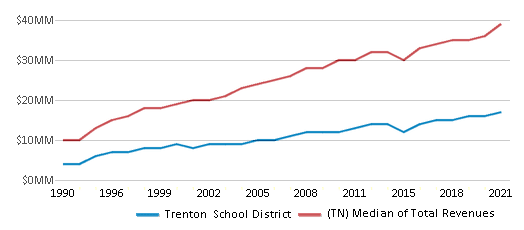
Spending
$18 MM
$11,597 MM
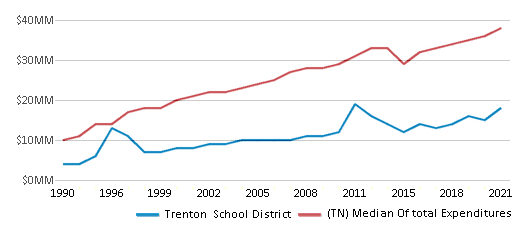
Revenue / Student
$12,711
$11,979
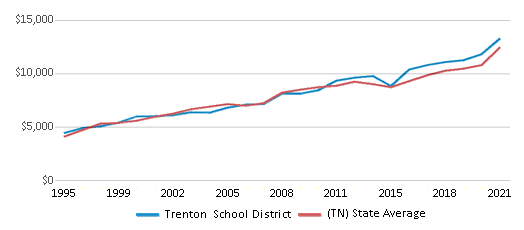
Spending / Student
$12,822
$11,478
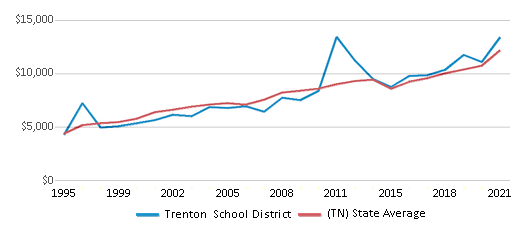
Best Trenton School District Public Schools (2025)
School
(Math and Reading Proficiency)
(Math and Reading Proficiency)
Location
Grades
Students
Rank: #11.
Trenton Elementary School
(Math: 30-34% | Reading: 35-39%)
Rank:
Rank:
7/
Top 50%10
811 S College St
Trenton, TN 38382
(731) 855-0971
Trenton, TN 38382
(731) 855-0971
Grades: PK-4
| 550 students
Rank: #22.
Trenton Middle School
(Math: 30% | Reading: 27%)
Rank:
Rank:
5/
Bottom 50%10
2065 Hwy 45 Bypass
Trenton, TN 38382
(731) 855-2422
Trenton, TN 38382
(731) 855-2422
Grades: 5-8
| 398 students
Rank: #33.
Peabody High School
(Math: 19% | Reading: 30-34%)
Rank:
Rank:
4/
Bottom 50%10
2069 Hwy 45 Bypass
Trenton, TN 38382
(731) 855-2601
Trenton, TN 38382
(731) 855-2601
Grades: 9-12
| 418 students
Frequently Asked Questions
How many schools belong to Trenton School District?
Trenton School District manages 3 public schools serving 1,366 students.
What is the rank of Trenton School District?
Trenton School District is ranked #95 out of 147 school districts in Tennessee (bottom 50%) based off of combined math and reading proficiency testing data for the 2021-2022 school year. This district ranks in the top 20% of Tennessee school districts for: Highest graduation rate (Top 20%) and Most diverse schools (Top 1%)
What is the racial composition of students in Trenton School District?
61% of Trenton School District students are White, 24% of students are Black, 10% of students are Hispanic, and 5% of students are Two or more races.
What is the student/teacher ratio of Trenton School District?
Trenton School District has a student/teacher ratio of 16:1, which is higher than the Tennessee state average of 15:1.
What is Trenton School District's spending/student ratio?
The school district's spending/student of $12,822 is higher than the state median of $11,478. The school district spending/student has stayed relatively flat over four school years.
Recent Articles

What Is A Charter School?
Explore the world of charter schools in this comprehensive guide. Learn about their history, how they operate, and the pros and cons of this educational innovation. Discover key facts about charter schools, including admission policies, demographics, and funding, as well as what to look for when considering a charter school for your child.

10 Reasons Why High School Sports Benefit Students
Discover the 10 compelling reasons why high school sports are beneficial for students. This comprehensive article explores how athletics enhance academic performance, foster personal growth, and develop crucial life skills. From improved fitness and time management to leadership development and community representation, learn why participating in high school sports can be a game-changer for students' overall success and well-being.

February 05, 2025
Understanding the U.S. Department of Education: Structure, Impact, and EvolutionWe explore how the Department of Education shapes American education, from its cabinet-level leadership to its impact on millions of students, written for general audiences seeking clarity on this vital institution.





